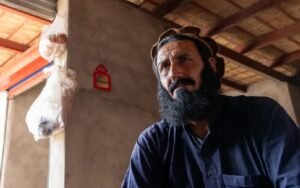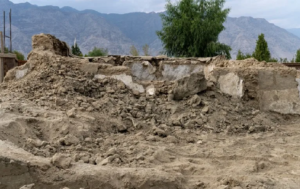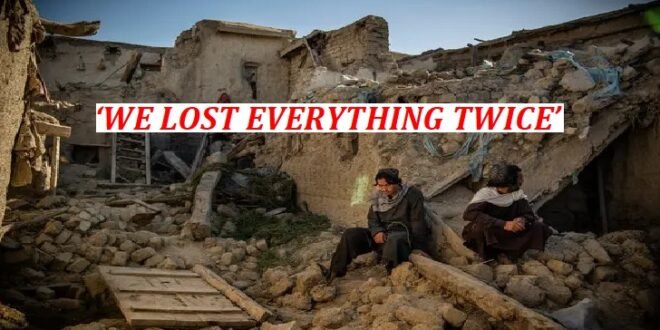22-09-2025
KABUL/ KUNAR: Four months ago, Nawab Din returned to his home village of Wadir, high in the mountains of Afghanistan’s eastern Kunar province, after eight years as a refugee in Pakistan.
Today, he lives in a tent on his own farmland. His house was destroyed nearly three weeks ago by the earthquake that has shattered the lives of thousands of others in this region.
 “We are living in tent camps now,” the 55-year-old farmer said, speaking at his cousin’s shop in the nearby village of Noorgal. “Our houses were old, and none were left standing … They were all destroyed by big boulders falling from the mountain during the earthquake.”
“We are living in tent camps now,” the 55-year-old farmer said, speaking at his cousin’s shop in the nearby village of Noorgal. “Our houses were old, and none were left standing … They were all destroyed by big boulders falling from the mountain during the earthquake.”
Din’s struggle captures the double disaster facing a huge number of Afghans. He is among more than four million people who have returned from Iran and Pakistan since September 2023, according to the International Organization for Migration (IOM).
The August 31 earthquake killed about 2,200 people and destroyed more than 5,000 homes, compounding a widespread economic crisis.
“We lost everything we have worked for in Pakistan, and now we lost everything here,” Din adds.
Until four months ago, he had been living in Daska, a city in Pakistan’s Sialkot District, for eight years after fleeing his village in Afghanistan when ISIL (ISIS) fighters told him to join them or leave.
“I refused to join ISIL and I was forced to migrate to Pakistan,” he explains.
His exile ended abruptly this year as the Pakistani government continues its nationwide crackdown on undocumented foreign nationals.
He describes how Pakistani police raided his house, taking him and his family to a camp to be processed for deportation. “I returned from Pakistan as we were told our time there was finished and we had to leave,” he says.
 “We had to spend two nights at Torkham border crossing until we were registered by Afghan authorities, before we could return to our village.”
“We had to spend two nights at Torkham border crossing until we were registered by Afghan authorities, before we could return to our village.”
This struggle is echoed across Kunar. Some 12km from Noorgal, in the village of Barabat, 58-year-old Sadat Khan sits next to the rubble of the home he had been renting until the earthquake struck.
Khan returned from Pakistan willingly as his health was failing and he could no longer find work to support his wife and seven children. Now, the earthquake has taken what little he had left.
“I was poor in Pakistan as well. I was the only one working and my entire family was depending on me,” he tells media. “We don’t know where the next meal will come from. There is no work here and I have problems with my lungs. I have trouble breathing if I do more effort.”
He says his request to local authorities for a tent for his family has so far gone unanswered. “I went to the authorities to request a tent to install here,” he says. “We haven’t received anything, so I asked someone to give me a room for a while, for my children. My uncle had mercy on me and let me stay in one room in his house, now that the winter is coming.”
The earthquake is only the most visible of the crises that returnees from Iran and Pakistan are facing.
“Our land is barren, and we have no stream or river close to the village,” says Din. “Our farming and our life depend entirely on rainfall, and we haven’t seen much of it lately. Other people wonder how we can live there with such severe water shortage.” (Int’l Monitoring Desk)
 Pressmediaofindia
Pressmediaofindia




